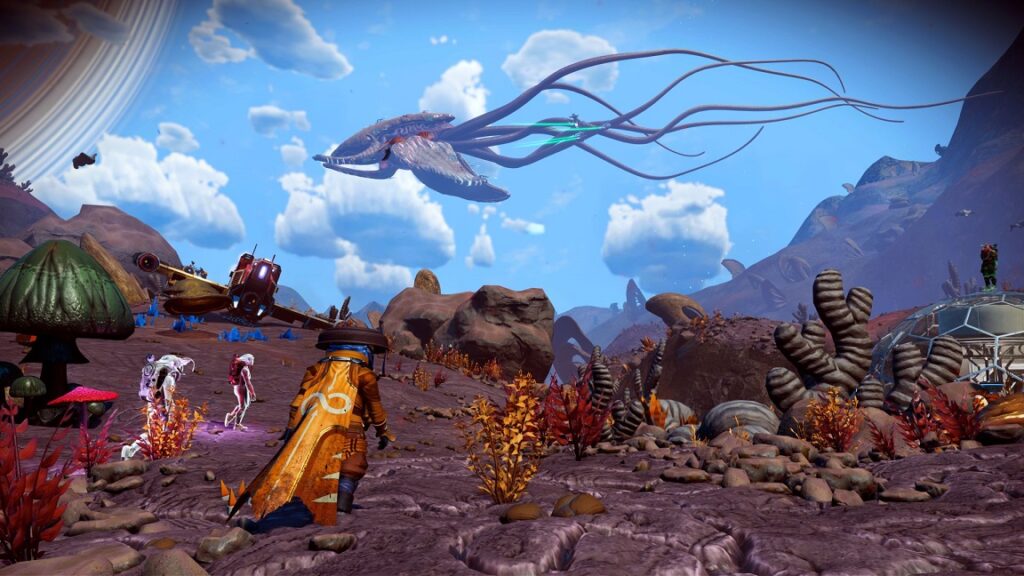
When Does No Man’s Sky Get Good?
Despite a rocky start, No Man’s Sky has become a critical and commercial darling in one of the most impressive turnarounds in gaming history. Fans of the game say it can be a slow start while new players familiarize themselves with the gameplay, but can reward those with explorer mindsets immensely. Most will say give the game at least 10 hours before making a call as to whether or not it’s a game you want to keep playing.
What Fans Say
Fans of No Man’s Sky often praise the game for its unprecedented scope and ambition. Developed by Hello Games, this space exploration title offers players a procedurally generated universe with billions of planets to discover. Fans admire the freedom to explore, build bases, trade, and interact with alien species. Many highlight the stunning visuals, particularly after updates that enhanced planetary biomes, water, and weather systems.
The game’s evolution is a central aspect of its appeal. Players laud Hello Games’ dedication to expanding the game with free updates, which introduced multiplayer modes, VR support, and massive content overhauls like Next, Beyond, and Origins. This transformation has created a loyal community that celebrates the game as a living project.
—
—
What Haters Say
Critics of No Man’s Sky often reference its controversial launch in 2016, which fell short of the lofty promises made during its marketing campaign. Many players felt that the lack of multiplayer features, limited gameplay mechanics, and repetitive exploration did not live up to the hype.
Although updates have addressed many of these concerns, some critics argue that the core gameplay loop—scanning planets, collecting resources, and crafting—is still repetitive. Others feel that the sheer scale of the game dilutes its sense of purpose, making it feel more like a tech demo than a cohesive experience.
Aggregated Critic Commentary
Critics have had a mixed but gradually improving perspective on No Man’s Sky. At launch, reviews highlighted the disparity between expectations and reality, resulting in a lukewarm reception. However, subsequent updates have shifted the narrative. Critics now commend Hello Games for turning the game around, setting an industry example of post-launch commitment.
Publications like IGN and Game Informer note the breadth of content added over the years, making it feel like a completely new game. While not without flaws, No Man’s Sky is often cited as a redemption story in gaming, showing how developers can respond to feedback and evolve their projects.
Overview of No Man’s Sky
Released in 2016 by Hello Games, No Man’s Sky is an open-world space exploration game that puts players in a procedurally generated universe. At its core, the game allows players to pilot a spaceship, explore planets, and interact with alien lifeforms. Its appeal lies in its unprecedented scale, with over 18 quintillion planets, each unique in terrain, ecosystems, and weather conditions.
Players begin their journey with a broken spaceship, scavenging for resources to repair it and reach the stars. From there, the game opens up, offering a non-linear experience where players can pursue their interests. Whether mining rare minerals, establishing colonies, engaging in space combat, or unraveling the mysteries of the universe, the game encourages creativity and curiosity.
The initial release was marred by unmet promises and missing features, but Hello Games responded with a series of substantial updates. Additions like Next, which introduced base-building and multiplayer, and Beyond, which added VR support, significantly broadened the game’s appeal. Over time, No Man’s Sky has transformed into a sandbox where players can lose themselves in infinite possibilities.
Similar Games
Here are three to five games that offer comparable experiences to No Man’s Sky:
- Elite Dangerous
A massive multiplayer online game centered around space exploration, trade, and combat. Its galaxy is modeled after the Milky Way, offering a similarly vast and open-ended experience. - Starbound
A 2D sandbox game with exploration, crafting, and procedurally generated planets. While simpler in presentation, it shares No Man’s Sky’s love for discovery and creativity. - Outer Wilds
A critically acclaimed indie game focusing on a time-loop mechanic and exploration of a small but intricately detailed solar system. - Subnautica
This underwater exploration game mirrors No Man’s Sky’s emphasis on discovery and survival but confines it to an alien ocean world teeming with mystery and danger. - Kerbal Space Program
A simulation game focused on designing spacecraft and exploring the cosmos. It shares the wonder of space exploration with a more technical, physics-based approach.
If You Liked These, You’ll Like No Man’s Sky
- Minecraft
Like No Man’s Sky, Minecraft allows players to gather resources, build structures, and explore procedurally generated worlds. Both games emphasize freedom and creativity. - Mass Effect Series
Although more narrative-driven, the Mass Effect games offer a deep space exploration experience, complete with alien interactions and moral choices. - Astroneer
A whimsical game focused on planetary exploration and crafting, perfect for players who enjoy the resource-gathering aspects of No Man’s Sky. - Spore
A life simulation game where players evolve creatures from single cells to intergalactic civilizations, capturing a similar sense of scale and discovery.